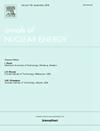900 K时氢浓度对氢化物中子缓和的影响
IF 2.3
3区 工程技术
Q1 NUCLEAR SCIENCE & TECHNOLOGY
引用次数: 0
摘要
研究了几种金属氢化物的中子衰减和渗透特性,以确定金属氢化物作为中子减速剂和屏蔽剂的效果。这些金属氢化物包括钇、锆和钇铬基氢化物和氘化物。利用蒙特卡罗n粒子输运模拟确定了这些氢化物的中子衰减系数μn和中子渗透系数ξn。杂质对特定氢化物缓和效果的影响是通过比较理想的或纯的氢化物成分与含杂质水平的金属氢化物进行评估的。分析表明,与纯钇相比,金属合金氢化物,特别是含钇- 5wt %铬的金属合金氢化物和其他含钇杂质材料的金属合金氢化物不会显著降低慢化剂的慢化能力。分析还比较了钇和锆的不同氢化物之间的缓和能力差异,其中锆在中子衰减方面表现更好,但钇在所研究的能量范围内的中子渗透方面表现更好。本文章由计算机程序翻译,如有差异,请以英文原文为准。
Effect of hydrogen concentration on neutron moderation of hydrides at 900 K
The neutron attenuation and permeation characteristics of several metal hydrides were studied to determine the efficacy of metal hydrides as neutron moderators and shields. These metal hydrides comprised yttrium, zirconium, and yttrium-chromium-based hydrides and deuterides. Neutron attenuation coefficients () and neutron permeation coefficients () of these hydrides were determined using Monte Carlo N-Particle (MCNP) transport simulations. The effect of impurities on the moderating efficacy of specific hydrides was evaluated by comparing ideal, or pure, hydride compositions with hydrides of metals containing impurity levels typical of commercially available metal alloys. The analysis showed that metal alloy hydrides, particularly those of a yttrium-5 wt% chromium and other impurity containing yttrium materials do not significantly decrease the moderating capability of the moderator when compared to pure yttrium. The analysis also compared the difference in moderating capabilities between the different hydrides of yttrium and zirconium, where zirconium performs better for neutron attenuation, but yttrium performs better with respect to neutron permeation over the range of energies investigated.
求助全文
通过发布文献求助,成功后即可免费获取论文全文。
去求助
来源期刊

Annals of Nuclear Energy
工程技术-核科学技术
CiteScore
4.30
自引率
21.10%
发文量
632
审稿时长
7.3 months
期刊介绍:
Annals of Nuclear Energy provides an international medium for the communication of original research, ideas and developments in all areas of the field of nuclear energy science and technology. Its scope embraces nuclear fuel reserves, fuel cycles and cost, materials, processing, system and component technology (fission only), design and optimization, direct conversion of nuclear energy sources, environmental control, reactor physics, heat transfer and fluid dynamics, structural analysis, fuel management, future developments, nuclear fuel and safety, nuclear aerosol, neutron physics, computer technology (both software and hardware), risk assessment, radioactive waste disposal and reactor thermal hydraulics. Papers submitted to Annals need to demonstrate a clear link to nuclear power generation/nuclear engineering. Papers which deal with pure nuclear physics, pure health physics, imaging, or attenuation and shielding properties of concretes and various geological materials are not within the scope of the journal. Also, papers that deal with policy or economics are not within the scope of the journal.
 求助内容:
求助内容: 应助结果提醒方式:
应助结果提醒方式:


